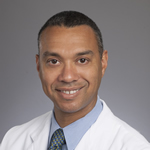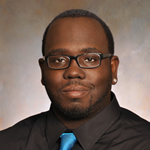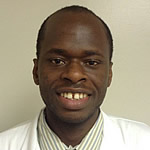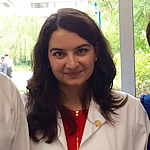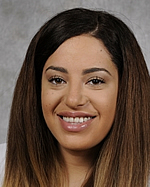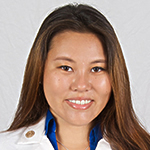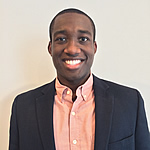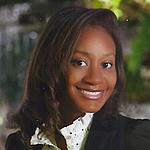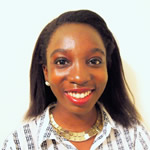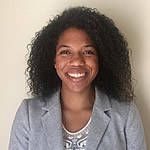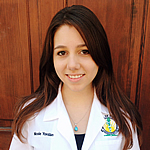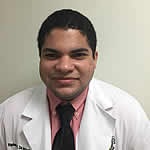Since its inception, ASH’s Minority Recruitment Initiative has awarded more than 100 scholars throughout the United States and Canada a career-development grant. The initiative includes the Minority Medical Student Award Program (MMSAP), Minority Graduate Student Abstract Achievement Award (MGSAAA), and ASH-Harold Amos Medical Faculty Development Program (ASH-AMFDP). The MMSAP, offered to first- and second-year medical students in DO, MD, or MD/PhD programs, is the oldest and perhaps the most well-known of these prestigious awards. Each year, a group of students entrench themselves in hematology-related summer research projects that they themselves design, working with research and career mentors at top institutions. The goal for both ASH and the dedicated ASH members who serve as mentors, is to spark a sustained interest in hematology among program winners, as is exemplified by Mr. Odia Eigbire-molen, whose two-year MMSAP experience offered him increased exposure to, and a greater sense of engagement with, the field. ASH’s hope for all grant winners is that their journey in hematology is just beginning.
At the next career level, the mission of the MGSAAA is to attract and retain PhD graduate students by offering the opportunity to submit an abstract and present their research at the ASH annual meeting. For scholars continuing their research training beyond graduate school, ASH-AMFDP supports and solidifies young researchers’ commitment to curing blood diseases with four-year research grants, while at the same time building the pipeline of underrepresented minority scholars for academic and research appointments.
From ASH-AMFDP Scholar, to ASH Mentor, to ASH Leadership
Christopher Flowers
Christopher Flowers Emory University
In His Own Words
How has your experience as an ASH-AMFDP recipient influenced your research and your career trajectory since? The ASH-AMFDP provided a strong foundation for my future research and career development goals. I worked with national and world experts in clinical research and gained expertise in the mentorship of trainees, as well as in informatics and cancer health disparities research. I have served as a national leader in the mentorship of junior investigators pursuing careers in cancer research and the translation of clinical research findings into clinical practice guidelines, and as a faculty member and research mentor for the ASH MMSAP, ASH Clinical Research Training Institute, and Chair for the Lymphoma Research Foundation Clinical Research Mentoring Program. I have been a member of ASCO, American Cancer Society, and American College of Radiology committee for national guideline development. I am deeply committed to the career development of junior investigators in hematology clinical research.
What piece of wisdom would you share with a colleague who is just considering joining the MMSAP program as a research or career development mentor? The MMSAP serves a vital role in the development of a career in hematology. For some of my former MMSAP students this provided the initial insight that led them to pursue a career in academic medicine and hematology. I am very proud to say that I now have former MMSAP trainees who have pursued fellowship training in hematology, immunology, and transplantation, and one who is starting as a faculty member beginning her research career.
As a long-standing member of the ASH Committee on Promoting Diversity (previously the Ad Hoc Minority Committee), what can you share about ASH's Minority Recruitment Initiatives as part of the larger picture of diversity in this field? MMSAP and other recruitment initiatives from the ASH Committee on Promoting Diversity are a critical part of ASH's commitment to provide high-quality hematology care and research to all patients. I am very proud of this longstanding effort and the success that we have seen as a result of these programs.
MGSAA Recipient, 2011-2014
Colles Price
Colles Price, MS, PhD Dana-Farber Cancer Institute, Broad Institute of Harvard and M.I.T.
Research Mentor William C. Hahn, MD, PhD, Dana-Farber Cancer Institute, Harvard Medical School, Broad Institute of Harvard and M.I.T.
Research Project Using genomics to understand novel identified cancer contributors' susceptibilities
In His Own Words
How has the MGSAAA influenced the trajectory of your career and your work? It has been a great opportunity – one of the most amazing research experiences I have had in graduate school. I have presented several posters, which has enhanced my research and training. I have connected with new colleagues and obtained resources for my research from interested scientists and clinicians. The ASH community is collaborative and helpful, so it is great for trainees. Giving a talk at ASH boosted my career substantially.
What sparked your interest in the role of microRNAs in leukemia? In my graduate work, I had the privilege of working with Dr. Janet Rowley, who provided me with insight into chromosomal rearrangements and their important role in cancer biology and hematology. My other mentor, Dr. Jianjun Chen, is an important leader in understanding noncoding RNAs in cancer. The combination of these two led to my interest in microRNAs in leukemia. While the field has made progress in understanding microRNAs, it is clear there is still much work left to do.
What advice do you have for those just starting medical school who are considering a career in hematology? Find a network of colleagues. Not only will your classmates/friends be future scientific leaders, they also understand the challenges you are currently facing. Medical or graduate school does not need to be a solo endeavor; having a support system can be helpful. Also, it is of utmost importance to find good mentors throughout your career. As each mentor has his or her own strengths and weaknesses, it is important to have more than one. With the support of your colleagues and good mentors, a great career in hematology is guaranteed.
MMSAP Returning Participant
Odia Eigbire-molen
Odia Eigbire-molen Georgetown University School of Medicine
Research Project Brain volumetric changes in children with sickle cell disease (SCD)
Research Mentor Naomi Luban, MD, Children's National Medical Center and George Washington University School of Medicine
In His Own Words
How does this year’s project build upon last year’s?Last year, I learned the methodology used to determine brain volume changes and compared brain volumes of children with SCD with healthy children using magnetic resonance imaging to detect differences. I learned analysis techniques that I use in the current project, which is to determine changes in brain volume with age in children with SCD. We used brain images to assess the trajectory of brain volume changes in children with SCD, and we are looking for hematologic and other clinical risk factors that could contribute to changes in brain volume.
How do you see your project as contributing to the broader field? SCD affects almost 100,000 people in the United States and millions worldwide. One goal of this project is to identify clinical and hematologic risk factors for cerebral injury in SCD. Hopefully, this information will contribute to better understanding and management of the neurologic complications associated with SCD and ultimately improve the lives of individuals living with the condition.
How have your ASH mentors influenced you and contributed to your experience? My research mentor, Dr. Naomi Luban, and my career mentor, Dr. Deepika Darbari, have been very supportive throughout my MMSAP experience. They introduced me to the interesting and exciting field of hematology. I was able to interact with patients, see some procedures, and visit the NIH. Through my mentors, I was able to connect and collaborate with Dr. Michael DeBaun, the lead investigator of the Silent Cerebral Infarct Transfusion (SIT) Trial, which led to this year’s project. I don’t think these opportunities would have been possible without the support of my mentors.
First-Time MMSAP Participants
Katerina Konstantinoff
Katerina Konstantinoff Washington University School of Medicine
Research Project The role of megakaryocytes in granulocyte colony-stimulating factor (G-CSF); induced mobilization of hematopoietic stem cells (HSCs)
Research Mentor Daniel Link, MD, Washington University School of Medicine
In Her Own Words
Tell us a bit about your research project. What led you to select it? My project consists of working to determine if megakaryocytes play a role in the mobilization of HSCs by G-CSF. The translational nature of this project interested me as it works to further our understanding of G-CSF biology and has direct applications to patient care as well.
How do you see your project as contributing to the broader field of hematology or health care in general? G-CSF is routinely used in the clinic to mobilize hematopoietic stem and progenitor cells (HSPCs) from the bone marrow to the blood for transplant. This project aims to contribute to a more complete understanding of the mechanism of G-CSF–induced HSPC mobilization.
How has your research mentor influenced you or added to your experience in a way that was perhaps unexpected? Dr. Link is a leader in the field and an excellent mentor. He has been especially helpful in discussing the many opportunities available for research in my future career.
L Graham Rucker
L. Graham Rucker The Ohio State University College of Medicine
Research Project: Targeting the PRMT5 enzyme for upregulation of fetal hemoglobin in SCD
Research Mentor: Robert Baiocchi, MD, PhD, Ohio State Medical Center
In His Own Words: I am amazed by the complexity of sickle cell disease and how a single amino acid substitution can have such a profound impact on the lives of those born with it.
Samantha Glass
Samantha Glass University of Illinois at Chicago College of Medicine
Research Project: Health disparities in diffuse large B-cell lymphoma
Research Mentor: Christopher Flowers, MD, MS, Winship Cancer Institute, Emory University
In Her Own Words: I used patients' data to determine if the prevalence of ABC DLBCL is greater in African Americans than Caucasians, and if this difference affected their prognosis.
Taisha Doo
Taisha Doo University of Iowa Carver College of Medicine
Research Project: Effect of Type 2B Von Willebrand disease (vWD) ADAMTS13 cleavage products on platelet binding
Research Mentor: Jose Lopez, MD, Bloodworks Northwest
In Her Own Words: We tested the hypothesis that proteolytic fragments of von Willebrand factor generated by ADAMTS13 can modulate VWF adhesive functions and impact hemostasis and thrombosis.
Sean Fletcher
Sean Fletcher Harvard Medical School
Research Project: Characterizing end-of-life care for patients with myelodysplastic syndromes; health services and outcomes research
Research Mentor: Gregory A. Abel, MD, MPH, Dana-Farber Cancer Institute
In His Own Words: During my enriching research experience I have been able to hone my data analysis skills, shadow brilliant physicians, and work with a great team under Dr. Abel.
Kelli L_ Currie
Kelli L. Currie Meharry Medical College
Research Project:Children with SCD and history of parvovirus B19 infections and low baseline hemoglobin levels (<7.6 g/dL) have an increased odds of silent cerebral infarcts
Research Mentor:Michael Rutledge DeBaun, MD, MS, MPH, Vanderbilt University Medical Center
In Her Own Words:Working with Dr. DeBaun, I have gained valuable knowledge on all aspects of the research process, as well as valuable life lessons that will help me become the physician I wish to be.
Tolulope Rosanwo
Tolulope Rosanwo Case Western Reserve University School of Medicine
Research Project:SCD biochip: toward a simple and reliable way to monitor SCD; microfluidics/microfabrication/bioengineering/SCD
Research Mentor:Jane A. Little, MD, University Hospitals, Case Medical Center
In Her Own Words:Our work with the SCD Biochip investigates how the cellular adhesion properties of a patient's sickled red blood cells at baseline differ from when they are in crisis.
Jolene Afua Kokroko
Jolene Afua Kokroko University of California San Francisco School of Medicine
Research Project:SCD
Research Mentor:Carolyn C. Hoppe, MD, MPH, UCSF, Benioff Children's Hospital Oakland, Children's Hospital Oakland Research Institute
In Her Own Words:We will explore the association of previously identified polymorphisms with hemoglobin F and the relationship of these variants with disease severity, including stroke.
Nicole M Yordan Lopez
Nicole M. Yordán López University of Puerto Rico, Medical Sciences Campus
Research Project:Antitumor effects of phenothiazine antipsychotics on T-ALL cells; defining the protein phosphatase 2A subunits that are bound by perphenazine
Research Mentor:Alejandro Gutierrez, MD, Boston Children's Hospital
In Her Own Words:I did not have to follow a book of recipes, but was given the trust to design (and troubleshoot) a project that quickly felt my own. This was what made it truly enriching.
Felicia M_ Austin
Felicia M. Austin Howard University College of Medicine
Research Project:Phenotyping SCD patients for enhanced pain hypersensitivity/centralized pain; determine if phenotype is associated with polymorphisms in GCH1
Research Mentor:James G. Taylor VI, MD, Medical College of Wisconsin & National Institutes of Health
In Her Own Words:My research experience has increased my awareness of the variability and severity of pain in the SCD population; I have acquired more knowledge and desire to involve clinical research as a physician.
Rigoberto E_ de Jesus Pizarro
Rigoberto E. de Jesus Pizarro University of Puerto Rico, School of Medicine
Research Project:Characterization of the DNA damage response induced by vosaroxin and azacitidine in patients with myelodysplastic syndromes
Research Mentor:Matthew J. Walter, MD, Washington University of St. Louis, School of Medicine
In His Own Words:I characterized the DNA damage response induced by vosaroxin and azacitidine in clinical samples taken from patients before initiating therapy on a clinical trial with these agents, to correlate the DNA damage response with their response to treatment.
Tyler A_ Hyman
Tyler A. Hyman The Ohio State University College of Medicine
Research Project:Evaluating the effect of aryl hydrocarbon receptor modulation on AML sensitivity to NK-mediated cytotoxicity
Research Mentor:Michael A. Caligiuri, MD, James Cancer Hospital and Solove Research Institute, OSU Comprehensive Cancer Center
In Her Own Words:I gained experience culturing AML cells and learned flow cytometry, real-time PCR, and immunoblotting to determine how AHR modulation impacts AML.

